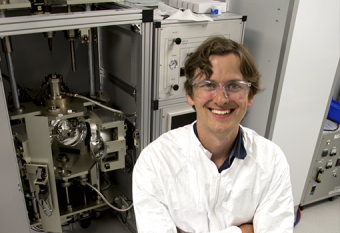
UC Santa Barbara materials professor Stephen Wilson is among the 149 researchers who have been elected fellows of the American Physical Society (APS) for 2024. No more than one-half of one percent of the society’s 50,000 members receive the honor from their peers each year in recognition of their exceptional original research and publication, or significant innovative contributions in the application of physics to science and technology. Wilson was cited by APS for his “pioneering studies of new classes of quantum materials, particularly kagome metals, highly frustrated triangular lattice antiferromagnets, and spin-orbit-assisted Mott states.”
“I am thrilled to be chosen as an APS Fellow,” said Wilson, who is also a fellow of the Neutron Scattering Society of America. “There are many fantastic physicists doing great work, and it is an absolute honor to have our group’s work recognized by the community”
Wilson serves as co-director of the first National Science Foundation Quantum Foundry at UCSB, which was established through a $25 million grant in 2019. Researchers affiliated with the Foundry work to develop materials that can enable quantum information-based technologies for such applications as quantum computing, communications, sensing, and communication. Wilson studies new states and phase behaviors across a broad array of quantum materials and focuses in particular in understanding many-body electronic states and emergent behavior. Through their work in the Foundry, Wilson’s lab members have discovered new unusual superconductors — materials in which electrical resistance disappears and magnetic fields are expelled — that could be useful in future quantum information applications, such as a topological computer.
Wilson says that his drive to discover new classes of materials stems from the fact that some of the most interesting materials in nature are those in which the competition between different energy scales or electronic interactions acts to frustrate what would happen in a conventional scenario. Oftentimes, the unusual properties observed in quantum materials arise from this competition.
“One of the fun things as an experimentalist is that there is often no reliable theoretical framework to predict what will happen in a given material,” explained Wilson. “So, it remains very much an experiment-led research field, and these materials have a seemingly unending ability to surprise us. The joy of discovering these surprises is what really drives me and my research group.”
Wilson’s election drives the total number of UCSB College of Engineering faculty members who are APS Fellows to twenty-four, two-thirds of whom are affiliated with the Materials Department.



